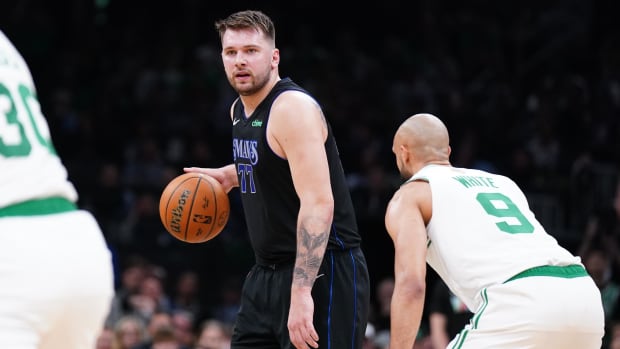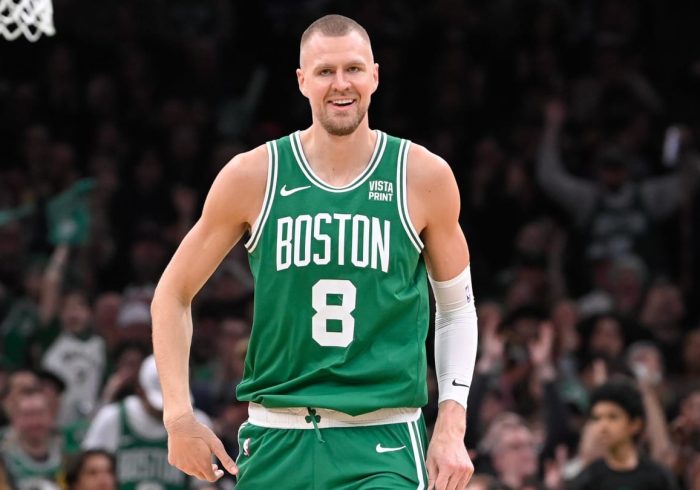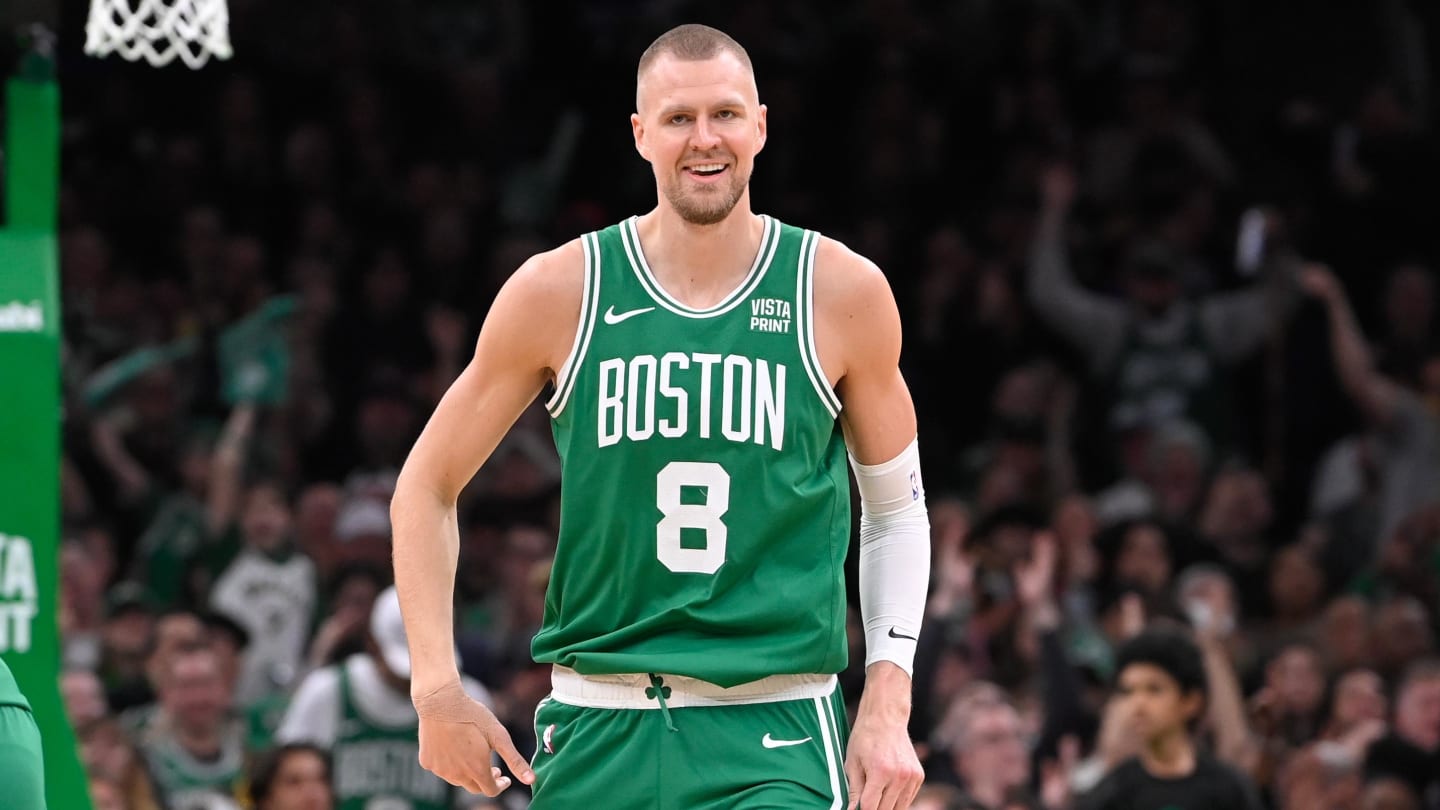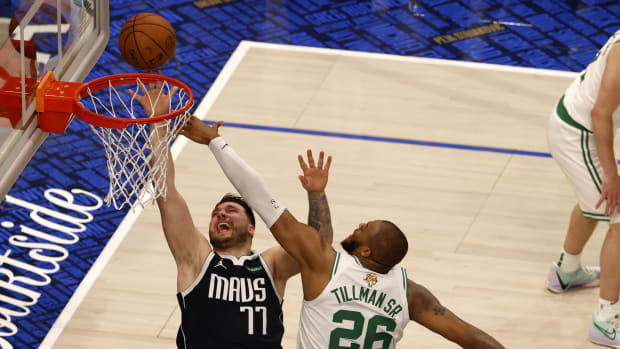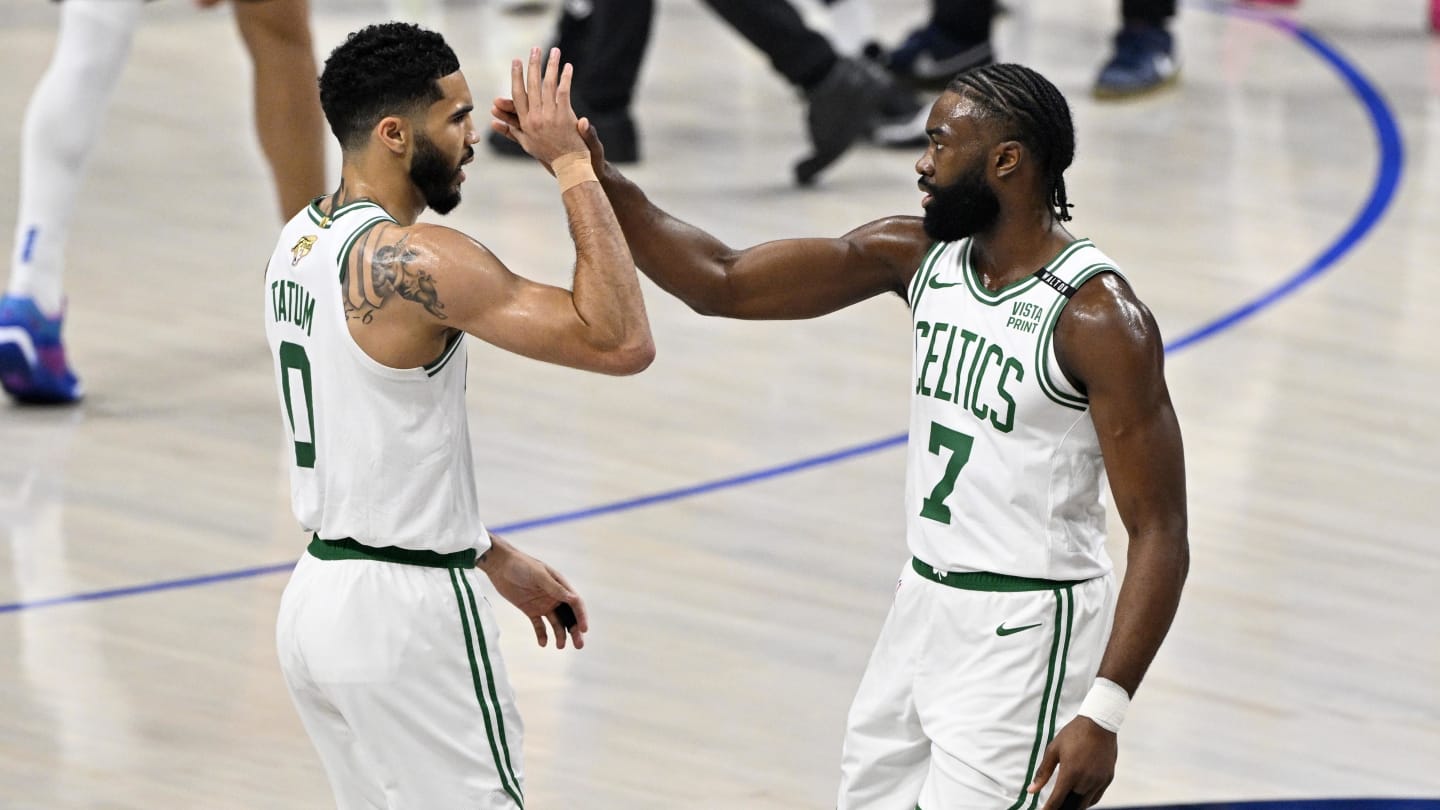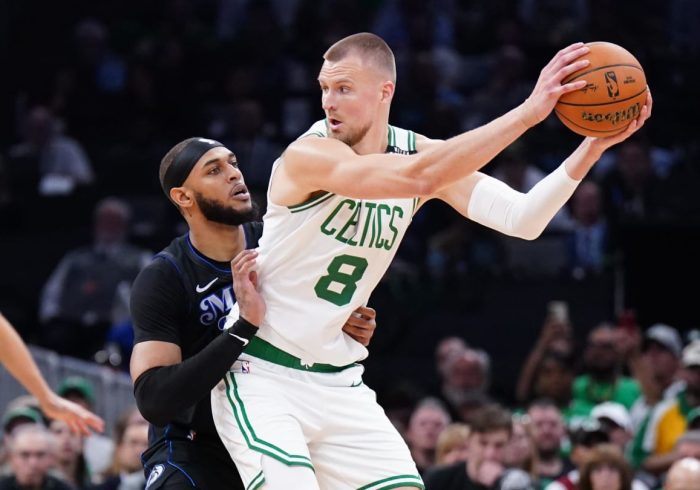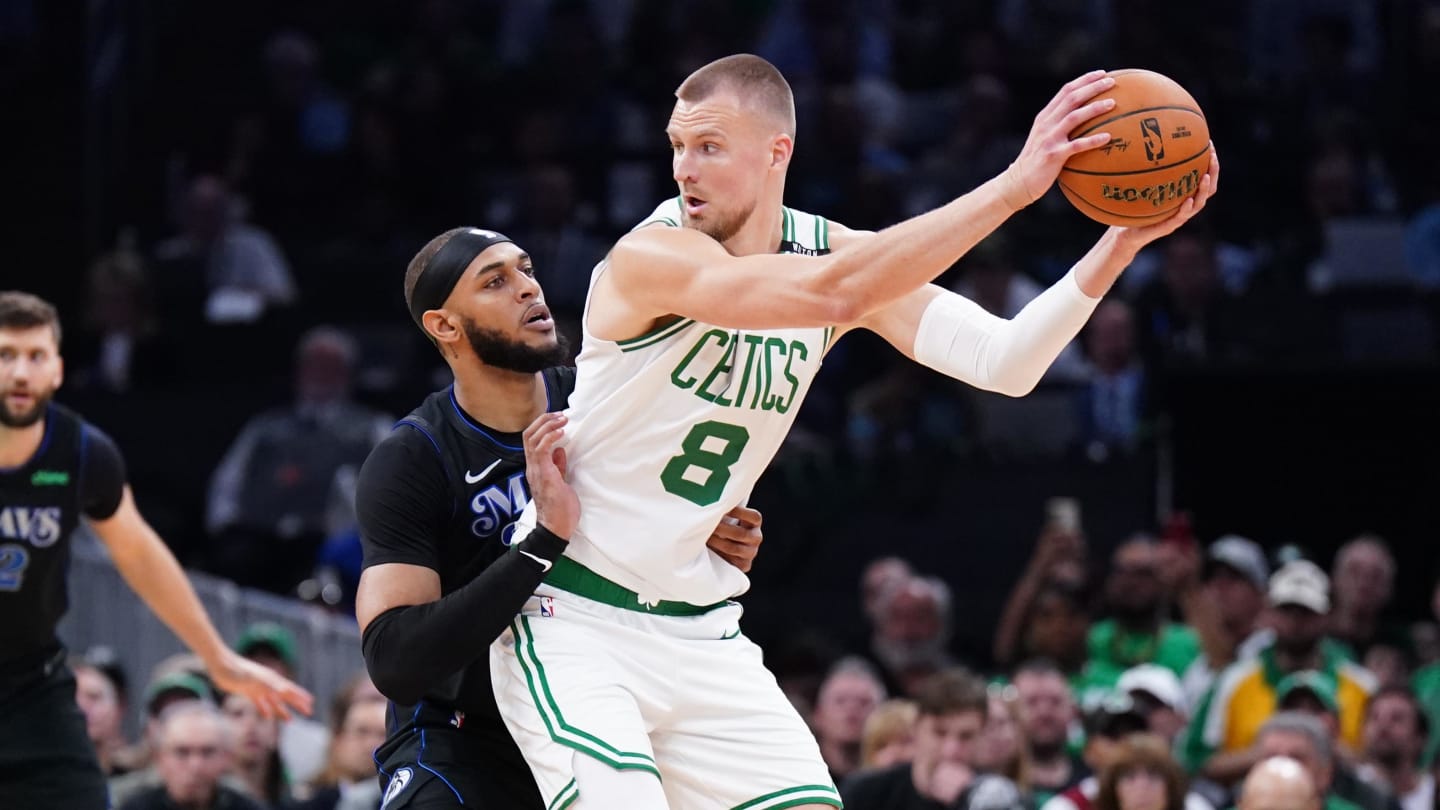BOSTON—News, notes and observations from the Boston Celtics’ 107–89 win Thursday in Game 1 of the NBA Finals over the Dallas Mavericks …
Returning to the Boston lineup for the first time in more than five weeks, Porzingis was outstanding, finishing Game 1 with 20 points (on 8 for 13 shooting), six rebounds and three blocks. Coming off the bench for the first time this season, Porzingis made an immediate impact, racking up 11 points in the first seven minutes, helping the Celtics build a 37–20 lead.
“Even if I have time off, I can jump right back in and I feel the same way,” Porzingis said. “I get to my spots, so whether it’s playoffs, regular season or whatever, I know how to do this. That’s it, just having that confidence, going out there whatever, first round or Finals, just going out there with full confidence and giving what I have to the team.”
As solid as Boston was during the conference playoffs—and the Celtics lost just one game after Porzingis went out in the first round with a calf injury—Porzingis’s return clearly makes Boston measurably better. Porzingis torched the Mavericks offensively, exploiting switches and forcing Dallas’s bigs to chase him beyond the three-point line. Defensively, Porzingis was a menace; the shots he didn’t block he contested and on screens he all but dared the Mavs wing players to take the ball to the rim.
“He was great for them,” Mavericks star guard Luka Doncic said. “He was knocking down shots. He was blocking shots. So he was really, really huge for them on both ends of the floor.”
As thrilled as the Celtics were to get Porzingis back, the 7’2” big man was happier to be there. He received a loud ovation when he came out to warm up hours before the game. And the crowd exploded when Porzingis popped up on the JumboTron making the walk down the back hallway and onto the floor.
“Getting that kind of support was unreal,” Porzingis said. “The adrenaline was pumping through my veins and that definitely helped. Obviously, it wasn’t ideal that I was out for such a long time, but I did everything I could to prepare mentally for this moment coming back. And it paid off and we got the job done tonight and had a good game and [I’m] happy about the result.”
Entering this series, the Celtics believed they were uniquely equipped to defend Doncic. They had two All-Defensive Team members (Jrue Holiday and Derrick White) and Jaylen Brown, who probably deserved to be on one. Doncic got his points (30 on 12 for 26 shooting) but finished the game with one assist, his lowest total of the season. The lobs that powered Dallas’s offense in the conference finals? Gone. The corner threes? Taken away. The Mavericks’ nine assists were their lowest total of the season.
“They did a great job defending, making it tough on us,” Dallas head coach Jason Kidd said. “We had some good looks that didn’t go down. We’ve got to move the ball. The ball just stuck too much.”
Said Boston head coach Joe Mazzulla, “I thought our defensive mindset, our defensive execution, our defensive game plan, our positioning, we had the right intentions and I thought we played really physical, for the most part, defending without fouling.”
Credit Brown, who glued himself to Doncic for most of his 37 minutes. Brown has the size and strength to stay in front of Doncic and the discipline not to bite on any of his pump-fakes. By not sending double teams, Boston shut down the rest of the Dallas offense; when Kidd waved the white flag in the fourth quarter, only two other Mavericks (Kyrie Irving and P.J. Washington) had scored in double figures and neither had more than 14 points.
“What you saw tonight is kind of the challenge he took for himself coming into the year,” Mazzulla said. “Not wanting to be defined by one thing. Wanting to make plays. Wanting to be a well-rounded player and get better and better. So his spacing, his ball movement, his defense on ball and off ball.”
The much-talked-about hostility from the TD Garden crowd toward Irving never materialized; it’s tough to get too fired up when your team spent most of the game leading by double digits. Irving’s return to Boston was a dismal one: 12 points (on 6 for 19 shooting), two assists and three turnovers. While Irving had to contend with Holiday most of the night, the ex–All-Star missed a lot of open looks, including several beyond the three-point line and three in the third quarter, when Dallas briefly cut the lead to single digits.
“They really rely on their great defensive ball pressure and one-on-one defenders,” Irving said. “They funnel us into certain areas. Even as I say that, that they are relying on the one-on-one, every time I got an iso, there’s almost two, three people waiting for me to get in there. I have to catch the ball on a live dribble and just be aware of my opportunities.”
The Celtics have been burying opponents in three-pointers all season, finishing first in the league in attempts (42.5 per game) and second in percentage (38.8%). In Game 1, the Celtics were 7 for 15 from three-point range in the first quarter, helping build the double-digit lead they wouldn’t surrender.
Hauser had a rough conference finals, connecting on 12.5% of his shots and making just one three in a four-game sweep of the Indiana Pacers. He shook that off in Game 1, collecting eight points and making both of his three-point attempts. When Dallas went Hauser-hunting in the first half, he responded, locking up Doncic on two possessions and forcing Irving into a missed three.
NBA commissioner Adam Silver didn’t provide one at his annual pre-Finals news conference. Silver declined to comment on reports the NBA had agreed to the framework of deals with ESPN, NBC and Amazon while passing on a specific question about whether or not Warner Bros. Discovery—the parent company for longtime NBA broadcast partner Turner—had the right to match any deal.
“It’s complicated for several reasons,” Silver said. “One is the advent of new platforms, particularly streaming, and the interest of streaming companies, and then the traditional media companies also carrying our games on streaming platforms. It’s complicated with multiple partners all seeking similar assets. In many cases, just figuring out the right way to balance those games as they go to different partners.
“We tend to do long-term deals. We think that’s good for the stability of the league, but it means, to a certain extent, you’re trying to predict the future, which is, of course, impossible. So part of it is a bet on the partners that we will ultimately align with and their ability also to adjust with the times and their willingness to continue to invest in media and also become global, which is very important to the league as well.”
